Today, I’m cutting the Granville Shirt in plaid and thought I’d share a few thoughts on cutting, sewing and making this shirt in plaid fabrics. As always, there are many things I think of while sewing that might be useful to share. This post is a play-by-play of what I did, with useful tips along the way.
For this post, I opted to cut most of the pieces on the straight grain. I didn’t allow enough extra fabric to cut bias pieces when I originally bought it. Patterns often instruct you to buy extra fabric to match plaids and stripes, but you’ll need to buy even more if you want to cut plaids and stripes on the bias!
For the front, I focused on ensuring the straight edge of centre front was placed along a straight plaid line, and I lined up a horizontal stripe below the dart line.
The reason I placed the line below the dart line is so the side seams would line up, otherwise if you use the armhole line, it’ll line up above the dart but possibly not below. I used the yellow lines as a guide since they stood out the most in this fabric. I then drew that same horizontal line across all of the body pattern pieces: front, back, side back.
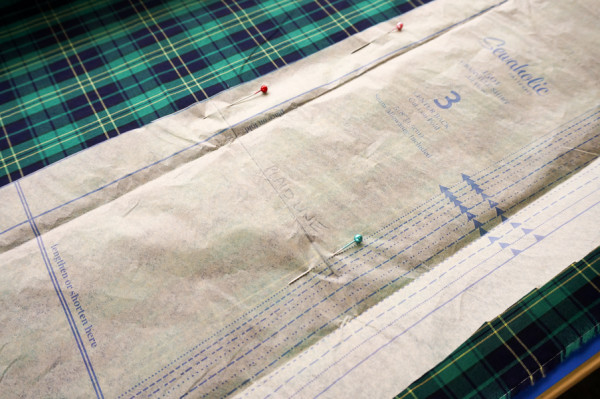
I cut out the fronts first, and was so excited that I sewed the front band right away, before cutting the rest of my pieces. It’s not a recommended approach but sometimes you’re so excited to start, you have to start!
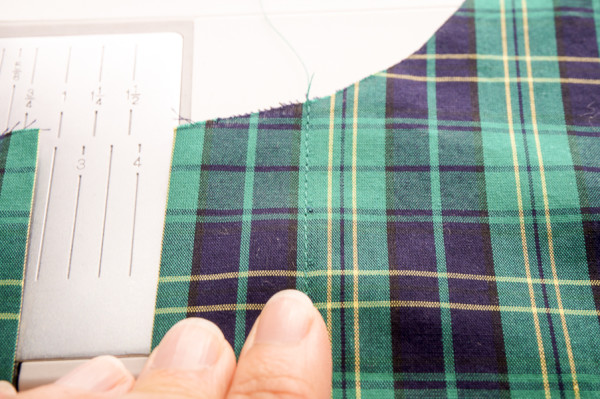
Instead of using the front band pattern piece, I left the extension on both pieces. The pattern instructs you to cut one side smaller, and then sew on a separate button band. I thought I’d make it easier and save fabric by cutting the button bands as part of each front. This also means one less piece to match!
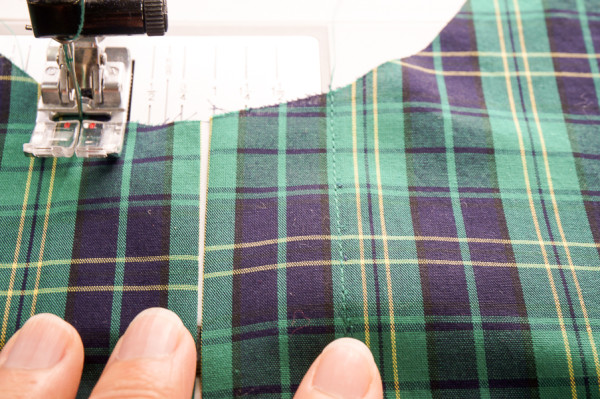
When topstitching the bands, sew with the right side up so you can sew evenly down a plaid line. Use the first band as a guide to sewing the second band – in the photo above, I’m sewing just inside the green stripe on the left, so it looks identical to the right side.
I also originally started with navy thread, but switched it to green when I realized the stitch line would be on a green section.
Look at how the centre front lines up across the button band. Nice eh?
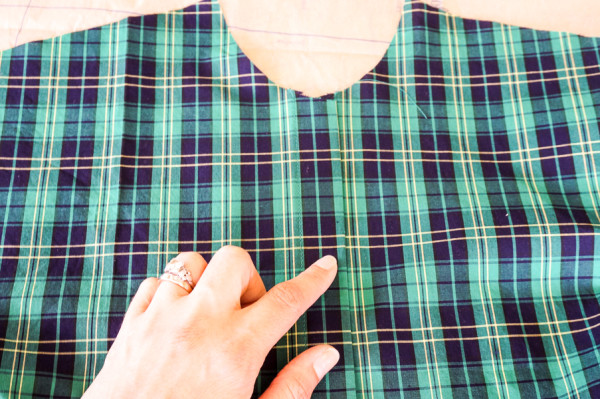
When cutting the side back pieces, I did the quick-matching method, rather than the way we described here where you pin through the plaid intersections.
Cut out one piece single-layer, then lay it down on the fabric, moving it around until the lines line up and the piece disappears. Can you see the lower, curved edge in the photo below?
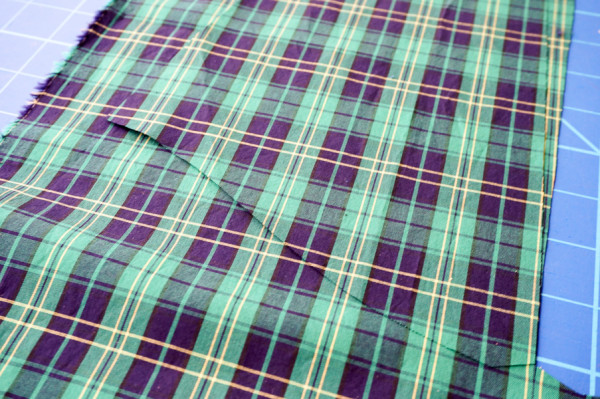
Take extra care to line up the lines, and then cut out the piece. You’ll end up with mirror-image pieces, like so!
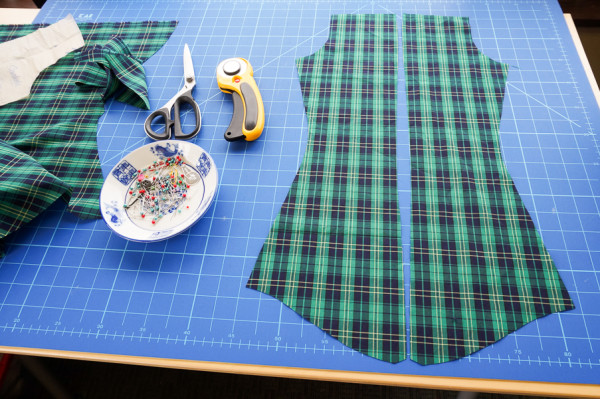
If there are a lot of pieces, I tend to work my way around the body. In this case, I started with the front, so I’ll do the side back next, then move to the back.
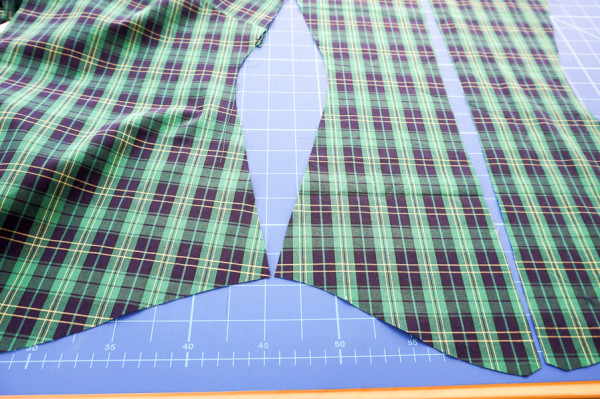
You can see that when it’s sewn, the side seam will line up across the horizontal lines. Pin it if you like, to check!
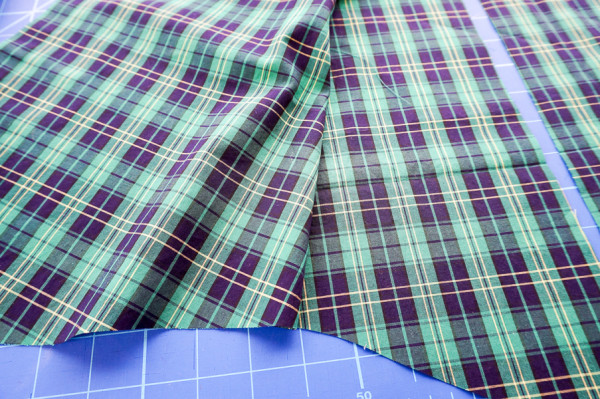
Next is the back. I decided that I wanted the thin green line, the one that’s in the middle of the thick navy stripe, to be my centre stripe. I’m placing the fold line of my pattern piece along that line. The fabric isn’t folded, it’s a single layer. (We’ll fold it later.)
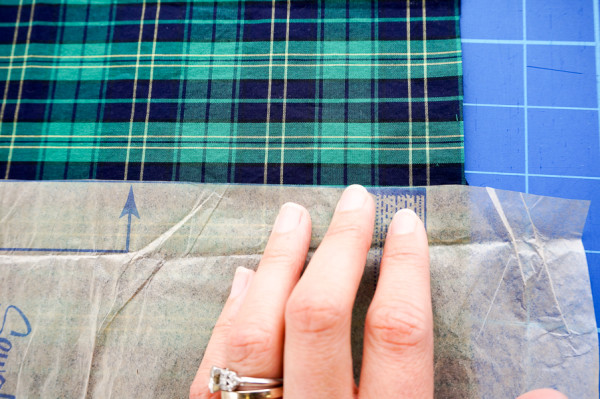
It’s most important to have a straight line down the middle of the back, so I’ll pin along the fold line to keep the pattern piece in place. I’m lining up the PLAID LINE marked on the pattern piece along the same yellow stripe, so the horizontal lines align all around the body.

Now I’ll cut only around the pattern piece edges. I’m leaving the fold alone for now. Do not cut along the fold line! If you’re easily distracted, place a pin or weight or book or something in the way. It sounds silly, but it’s easy to go on autopilot when cutting.
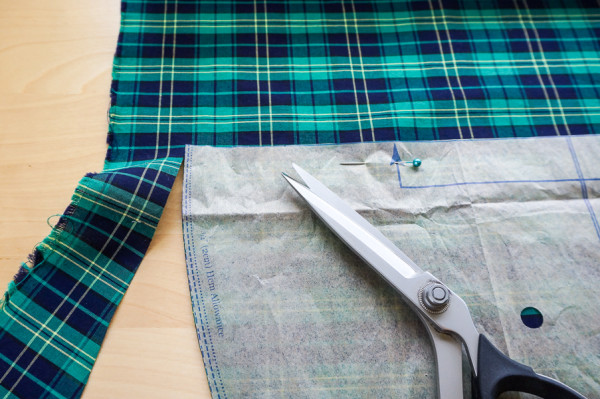
Remove the pattern tissue. Now, fold the fabric piece along the centre plaid line, the one we determined when laying out the piece. In my case, that’s the thin green line in the middle of the navy stripe. Depending on your fabric, you might prefer a ‘space’ between lines centered there instead of a stripe line.
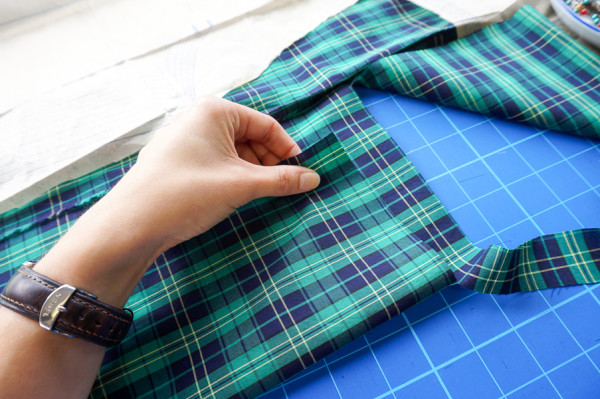
Take care to line up each horizontal stripe across the piece.
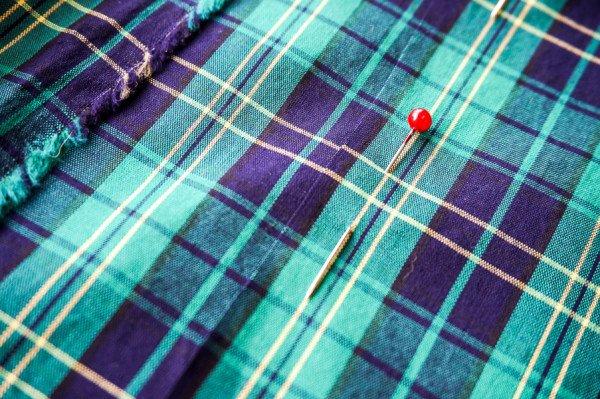
Cut around the fabric piece, using the cut edge as a guide.
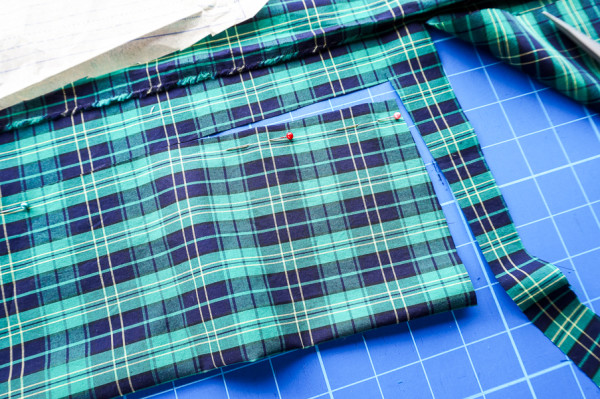
Here’s our back piece – take a look at the side edges. It’s pretty close. Sometimes there’s a tendency to cut the second half slightly larger, since you’re trying not to cut the original fabric edge. If that’s the case, even out any unevenness.
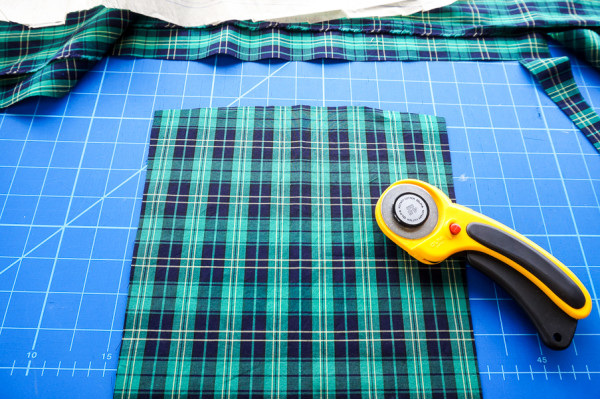
I did the same process to cut the yoke – cut half first, fold the cut half on to the other side of the fabric, cut around the fabric edges.
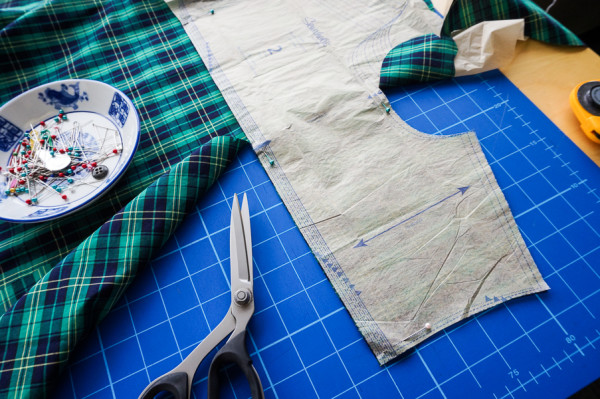
I used the first yoke piece to cut the second yoke piece.
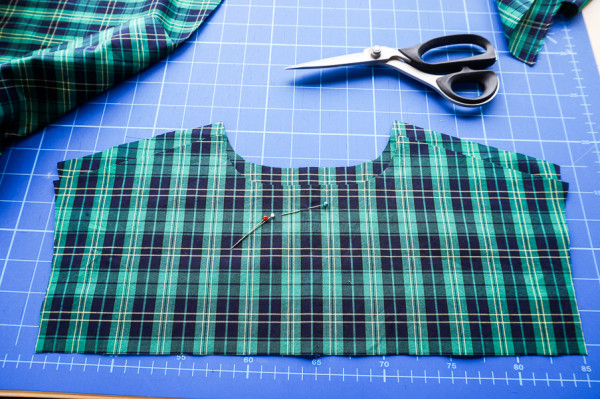
For the cuffs, you’re basically only using the pattern piece to get the correct dimensions. I figure out where I want the piece to fall on the fabric, then I’ll use the plaid lines for the actual cutting.
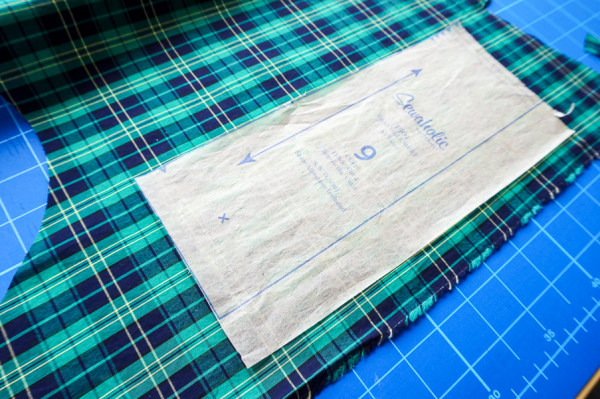
The top edge is between two yellow stripes, so I peel back the pattern piece and cut between the stripes.
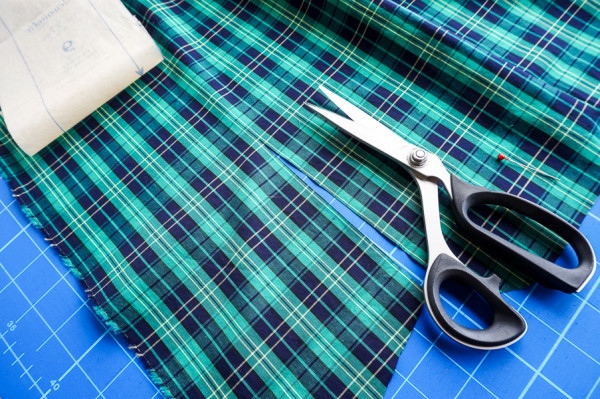
This plaid fabric is excellent for the Granville Shirt, because the distance between the stripes is exactly the width of the cuff piece! Neat. In the photo below, you can see the top edge is between two yellow lines, and so is the bottom edge!
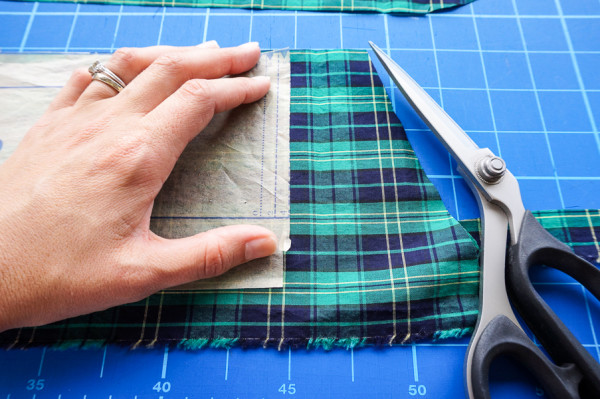
I cut along the short edge, then along the bottom edge. I’ll re-position the pattern piece and cut the last short edge.
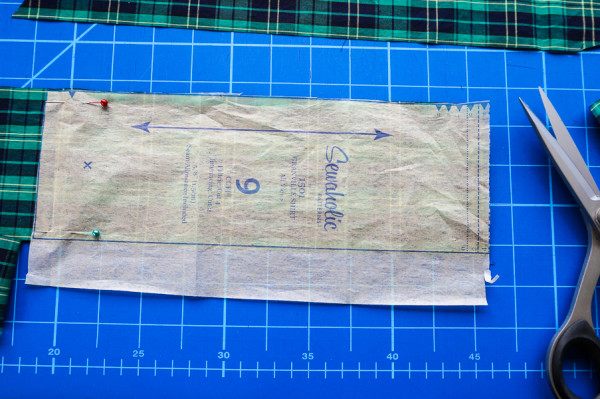
Use the cuff piece to cut three more identical cuff pieces.
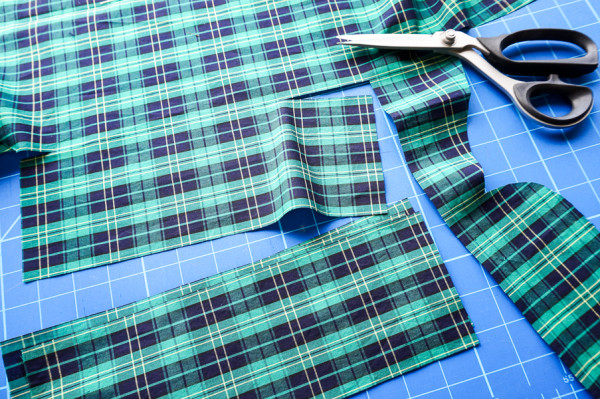
For the collar and collar stand, I’ve turned the pieces so they’re cut on the cross grain, rather than parallel to the fold or selvedge. This is so we can continue to place the same stripe line – thin green stripe on a thick navy stripe – down the middle of the piece. Use the notches as a guide to centering the piece on the plaid fabric.
I did the same thing as the yoke and back – cut half first, then fold it over. It’s a good habit for cutting plaid pieces on a fold.
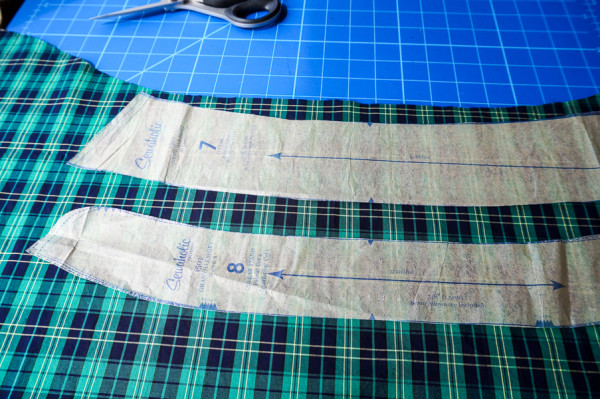
In the end, we have the same plaid line running vertically down the yoke, the collar, the collar stand and the back. Nice!
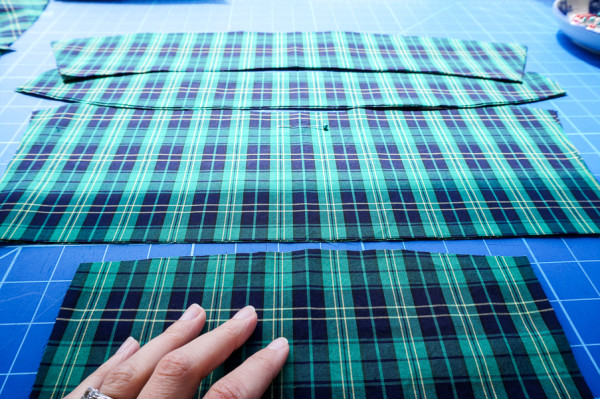
As with anything that requires matching while cutting – stripes, plaids or prints – the hard work is in the cutting. The sewing is easier than the cutting process. Now all we need to do is pin our pieces together correctly, and the plaid lines will line up across our seams.
See all posts on shirtmaking and sewing the Granville Shirt here. Get the Granville Shirt pattern here!

Thank you for this post! It’s very informative.
Thank you! I haven’t sewn anything plaid yet as I’ve been too nervous but this is super helpful :)
Matching up plaids and stripes, never easy. So I want to thank you very much for the time and effort involved in posting this! I too have been nervous, very nervous, but what you have posted, is super helpful! TFS, Annette
Thank you! I’ve been thinking about plaid pyjamas for Christmas. Love to see your shirt when it’s finished.
Very nice, clear tutorial! Makes matching plaids easy peasy.
I am about to cut out a plaid skirt – I feel more confident about it now. Thank you for the tips. Looking forward to seeing the finished shirt!